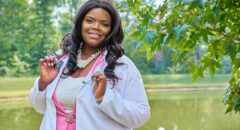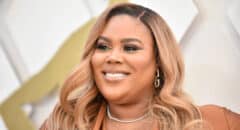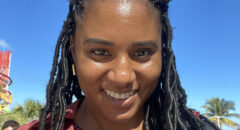delayed, more advanced breast cancer diagnoses. TOUCHBBCA created For the Love of My Gurls to speak up—we must talk about Black Breast Health to save each other. It’s up to us to take care of our gurls. Here are a few ways, recommended by our medical advisory board, that Black women can protect themselves while we await appropriate guidelines for higher-risk groups:
RELATED: Navigating Breast Cancer: Understanding Your Treatment Options
1. Individualized risk assessments
The first step in assessing your individual risk is knowing your HERstory or family health history! Your lifestyle, genetics, & personal and family health history all impact your cancer risk. Up to 10% of breast cancers are hereditary – meaning you may share the risk with your family. That’s why it’s so important to know your HERstory. Talk to both sides of your biological family to learn about all of the cancers in your family tree. If accessing your HERstory is difficult or impossible because of adoption, death, or other family events, know that there are other options for you. Visit loveofmygurls.org to learn more.
In addition to your HERstory, our medical advisors also recommend that Black women have a routinized risk assessment by age 25 to ensure they are not high risk and shouldn’t begin screening sooner.
“Early accurate risk assessment (i.e. before 25) is key, especially for Black women, and many Black women will benefit from beginning screening even earlier than 40,” advises Dr. Oluwadamilola Fayanju, MD, FACS—The Helen O. Dickens Presidential Associate Professor and Chief of the Breast Surgery Division at Penn Medicine.
You can ask your primary healthcare provider for a risk assessment or you can participate in a comprehensive online-based individualized risk assessment program like the WISDOM study (WisdomStudy.org).
“We need to move in the direction of individualized risk assessment to inform us on who needs to be screened when and how often,” says Dr. Sara Horton, MD—Executive Director of Access and Diversity at Quantum Leap Healthcare Collaborative. “It is obvious that there is something that is happening in the Black population (be it genetic, environmental, etc.) that is causing more of our women to be diagnosed with breast cancers at an earlier age. That is why I recommend the WISDOM study which is a virtual study using genetic info, breast density and traditional criteria to determine a risk and support informed decision-making.” For the Love of My Gurls partners with The WISDOM Study, which will be open to young women starting at age 30 in the coming months.
2. Breast self-exams
“My concern is that few organizations endorse self-breast exams,” explains Valarie Worthy, MSN, RN—Co-Founder and Director of Community Outreach at TOUCHBBCA and Patient Navigator Manager at Duke Cancer Center. “So, if mammograms begin at 40 and we have a significant number of Black women who are diagnosed with breast cancer under the age of 40 and self-breast exams are discouraged because the data has not shown that it saves lives, what should Black women do?”
For the Love of My Gurls recommends that young, Black women get to know their gurls and know their normal through monthly breast self-exams. Checking your breasts at least one week after your period should become part of your regular self-care routine.
3. Research and data
The U.S. Preventive Services Task Force and other major groups all make recommendations and policies based on quantitative research and data. When Black women don’t participate in that research, the results don’t reflect our needs.
“Please let’s figure out how to get evidence,” says Dr. Olufunmilayo I. Olopade, MD—Walter L. Palmer Distinguished Service Professor of Medicine, Professor of Human Genetics, and Director of the Center for Clinical Cancer Genetics and Global Health at the University of Chicago. “Some women should start screening at 30 and we need to know. Black is not a monolithic group, and we should not forget that we need better screening tools. We are going to need more research to derive better evidence.”
From screening guidelines to life-saving medications, it’s important that Black women are counted and heard. Only by participating in research can we make a difference in these guidelines and change the game for all Black women.
“We do have a lot more research that needs to be performed in the area of earlier screening for higher risk patients (especially women of color) under the age of 40 who do not necessarily have a genetic mutation,” explains Dr. Candice Thompson, MD—Clinical Assistant Professor of Surgery in Breast Surgical Oncology at Stanford Medicine. Learn more about participating in breast cancer research at whenwetrial.org.
If you do find something abnormal or unusual at any point in the process, insist on the care that you deserve. And know that we at TOUCH, The Black Breast Cancer Alliance (touchbbca.org) will continue to bring these discussions to stakeholders, legislators and researchers to fight to change the guidelines until they are in favor of saving the lives of Black women.








